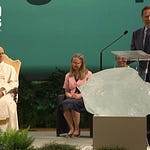Well that’s a wrap. We had a blast going to our first UK party conference in Liverpool - though as you’ll hear we’ve been to them in lots of other random places. All of which seemed less concerned about preventing the dread glitter attack.
Thanks to our partners Startup Coalition for organising the space and offering us the platform in Madre, such a great restaurant and bar, that was just on the edge of the security zone so you didn’t actually have to worry about the anti-glitter measures.
But there was one really prominent theme to come out of Labour Conference and we thing we captured it pretty well. Can the UK reclaim leadership in climate technology, sustainability, and innovation?
Our guests included:
Andrew Pakes, MP for Peterborough
Christian Hernandez, Founder, 2150.vc
Buffy Price, Co-founder and CEO, Carbon Re
Orla Shields, CEO and Founder, Kamma
Anna Bazely, Head of Government and Regulatory Affairs, Enoda
Paul McNamee, Director and Founder, Labour Climate and Environment Forum (LCEF)
With the new Labour government in power, the conversation explores how the party's ambitious climate agenda can be realized through a combination of public and private sector collaboration. From retrofitting homes and decarbonizing industry to rethinking energy infrastructure and building the green jobs of the future, this episode provides a window into the evolving dialogue between policy-makers and innovators in the climate tech space.
Key Discussion Points:
The Role of Private Sector Innovation in Decarbonization
Christian Hernandez from 2150 highlights the critical role private sector investors and startups play in accelerating climate solutions. He emphasizes the importance of deploying existing, scalable technologies—like heat pumps and energy-efficient infrastructure—while addressing the challenges of turning first-of-its-kind innovations into mainstream solutions. Hernandez also discusses the "time value of carbon," stressing that immediate action will have compounding benefits in the years ahead.Public Policy and the Climate Agenda
Andrew Pakes, MP for Peterborough, discusses the Labour Party’s focus on green jobs, skills development, and the importance of ensuring that climate action benefits working-class communities. He calls for a "people plan" alongside climate policies, ensuring that new technologies and innovations also create opportunities for workers through skills training and apprenticeships. Pakes advocates for pragmatic policies that deliver visible improvements in communities, from retrofitting homes to revitalizing local economies.AI and Decarbonizing Industry
Buffy Price, co-founder of Carbon Re, explains how artificial intelligence can be used to reduce emissions in high-carbon industries like cement. She challenges the over-reliance on long-term solutions like carbon capture and storage, arguing for immediate, scalable technologies that can drive emissions reductions now. Her approach focuses on process efficiencies that can deliver significant carbon savings without the need for costly infrastructure overhauls.The Built Environment and Housing Crisis
Orla Shields, CEO of Kamma, discusses the complexities of decarbonizing the UK’s housing stock and the potential of using data to better understand and improve energy efficiency in buildings. She underscores the need for reform in how mortgage lenders incentivize retrofitting and the critical role of both public and private sector collaboration in making housing more sustainable. Shields emphasizes that green mortgages and intelligent data can play a crucial role in creating a more energy-efficient built environment.Energy Infrastructure and Grid Resilience
Anna Bazely from Enoda speaks to the importance of modernizing the UK’s energy infrastructure to handle the growing demand for renewable energy. She highlights the need for grid-enhancing technologies and regulatory reforms that encourage innovation. Bazely stresses the urgency of tackling these issues now to ensure that the UK can meet its net-zero targets while maintaining energy security and affordability for consumers.The Politics of Climate Action
Paul McNamee, head of the Labour Climate and Environment Forum, offers a broader perspective on how Labour can maintain momentum in driving climate policy forward. He speaks to the importance of balancing long-term goals with short-term political realities and the need for effective communication to ensure the public sees the tangible benefits of climate action.
Takeaways:
Public-Private Collaboration is Key: Effective climate action will require deep cooperation between government, private investors, and the tech sector.
Skills Development and Green Jobs: A clear focus on green job creation and training is essential to ensuring that climate action benefits everyone, especially communities hit hardest by economic change.
Deploying Solutions Now: While innovation is critical, many existing technologies—such as AI for industrial efficiency and grid-enhancing technologies—can already be deployed at scale to start making an impact.
Community Engagement: Politicians and innovators alike must focus on engaging communities in climate solutions to ensure lasting support and build public trust.
And of course we used the opportunity to add to our playlist with a suitable outro track. But let us know what you think.
Connect with Us:
Twitter: @rdelevan
LinkedIn: https://www.linkedin.com/in/richarddelevan/
Email: info@wickedproblems.uk



















